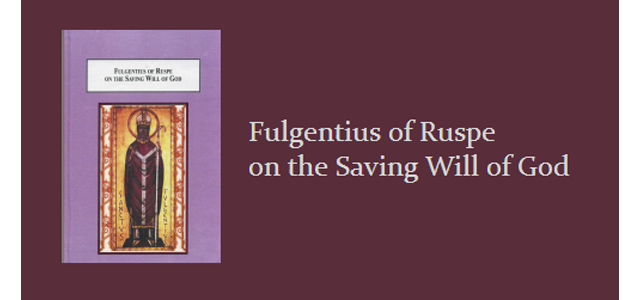Fulgentius was born in the year 468 and educated in Vandal North Africa. After a short career in finance he joined a monastery. He later was elevated to an abbot and in the year 508 became bishop of Ruspe, a coastal town in modern Tunisia.
Fulgentius defended the doctrine of the Trinity against Arianism, which was the official religion of the Vandals that denied that the Son was one in being with the Father. He was exiled for his Trinitarian faith to the island of Sardinia for fifteen years. Fulgentius also wrote treatises on grace, free will, and divine predestination. These works are largely the foci of my book entitled Fulgentius of Ruspe on the Saving Will of God: The Development of a Sixth-Century North African Bishop’s Interpretation of 1 Timothy 2:4 During the Semi-Pelagian Controversy (Mellen, 2009). It shows that in his earlier writings, Fulgentius often asserted the universality of God’s saving will and general grace. But as he entered a debate on grace and free will, he restricted that universality to all those among the nations predestined by God for salvation.
There are only two other books in print in English devoted to Fulgentius, and Fulgentius on the Saving Will of God is the only one devoted wholly to his theology of grace.  It is based upon the latest scholarship on Fulgentius, and in it many passages from his works are translated for the first time in English. In addition, other texts from his time period are translated therein, such as Caesarius of Arles’ On Grace and short works by John Maxentius. Available only in hardback and published by an academic press, Fulgentius on the Saving Will of God is expensive, but worth the investment for those interested in the theology of grace in church history, Augustinian studies, and the Semi-Pelagian debate.
It is based upon the latest scholarship on Fulgentius, and in it many passages from his works are translated for the first time in English. In addition, other texts from his time period are translated therein, such as Caesarius of Arles’ On Grace and short works by John Maxentius. Available only in hardback and published by an academic press, Fulgentius on the Saving Will of God is expensive, but worth the investment for those interested in the theology of grace in church history, Augustinian studies, and the Semi-Pelagian debate.
To read some reviews of Fulgentius of Ruspe on the Saving Will of God, click here.
To order a copy, click here. Happy reading. Frank
